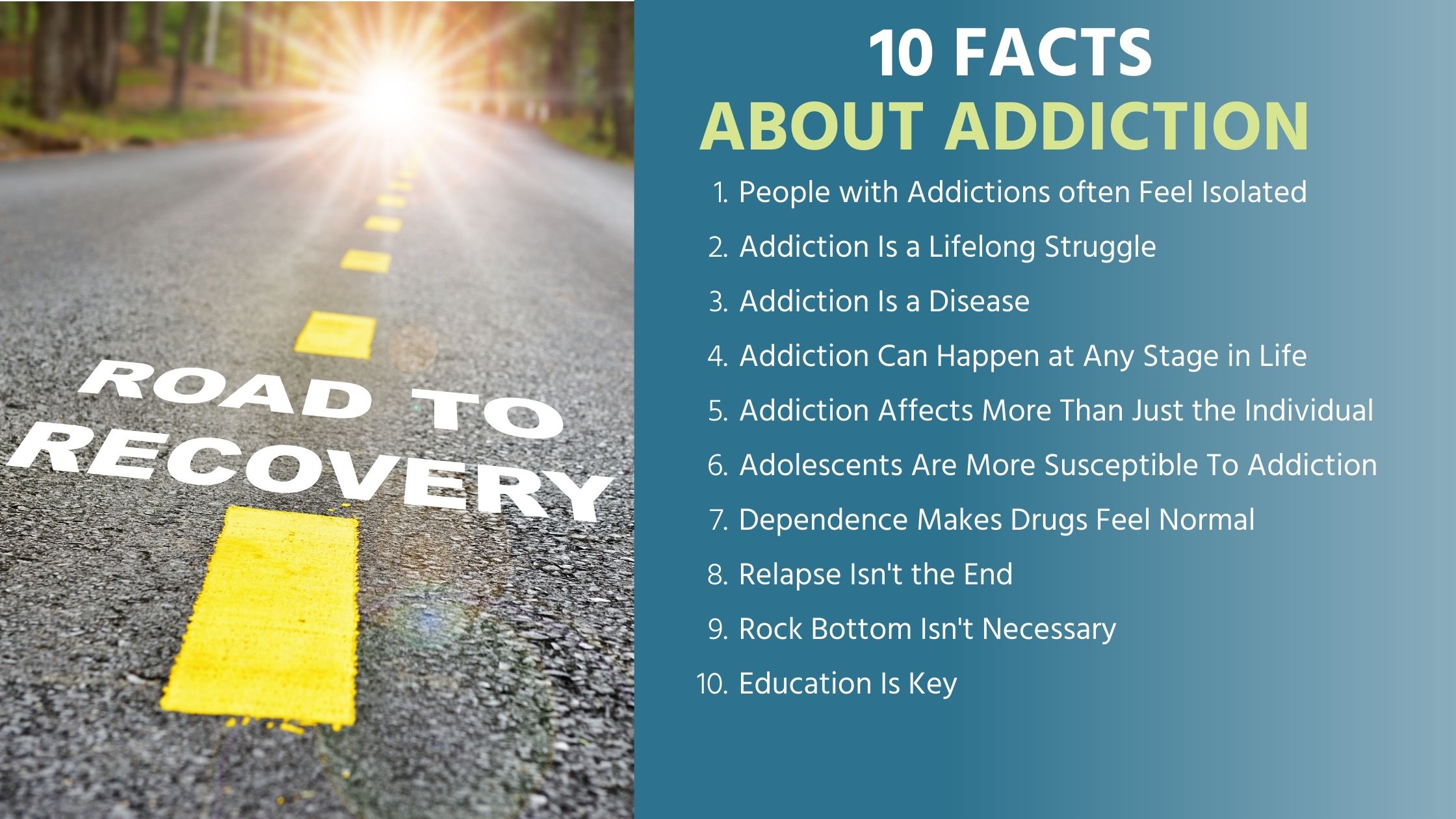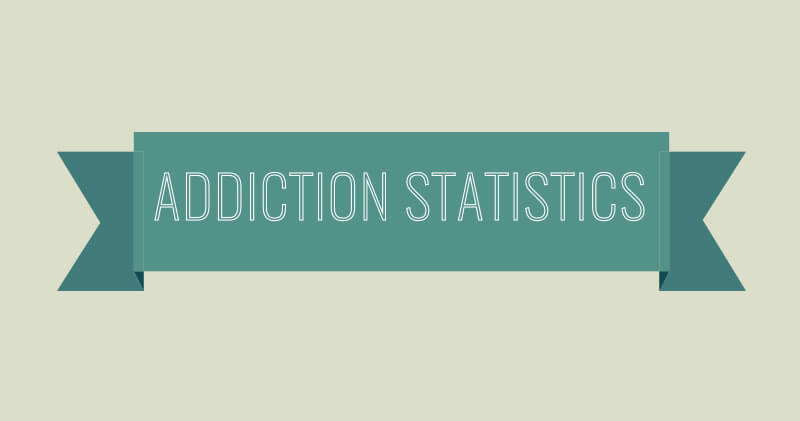Addiction is a health condition that’s often misunderstood and stigmatized by society. It’s a topic that demands a deeper understanding, a compassionate perspective, and an informed approach.
In this article, we aim to shed light on ten facts about addiction, from its nature as a lifelong disease to the profound sense of isolation that many people struggling with addiction endure. We delve into the realities of addiction that extend beyond individual struggles, affecting families, communities, and society at large.
Join us as we navigate these crucial insights, aiming to deepen our collective understanding of addiction—a vital step in addressing this pervasive issue.
1. People with Addictions often Feel Isolated
Many individuals grappling with addiction often face a profound sense of isolation. This is largely due to the societal stigma attached to substance use, which can lead to feelings of shame and fear of judgment.
This perceived isolation can intensify the struggles of addiction, fueling a destructive cycle of increased substance use and deepening loneliness. Also, these feelings of isolation can deter individuals from seeking help, further entrenching their addiction.
Understanding this issue is critical in our approach to addiction. By fostering supportive and non-judgmental environments, we can encourage open dialogue, reduce feelings of isolation, and promote recovery, breaking the cycle of addiction and loneliness.
2. Addiction Is a Lifelong Struggle
Much like chronic diseases such as heart disease or diabetes, addiction cannot be “cured” with a one-time treatment. Even after a person has successfully undergone treatment and achieved sobriety, the susceptibility to substance use disorders often remains.
This is due to the long-lasting changes in the brain caused by substance use. Understanding this lifelong nature of addiction is crucial to set realistic expectations. Continued support, care, and management are vital in maintaining recovery and preventing relapses. This emphasizes the need for comprehensive, long-term strategies in addiction treatment plans.
3. Addiction Is a Disease
Addiction is a disease, not a character flaw or a manifestation of moral weakness. It’s a complicated condition that affects the brain, leading to an uncontrollable urge to use substances despite their harmful effects.
This compulsive behavior stems from long-lasting changes in the brain’s structure and function caused by chronic substance use. These alterations can drive many harmful behaviors, often self-destructive, that characterize addiction.
Understanding addiction as a disease can help shift societal perceptions, framing it as a health issue that requires medical treatment and compassionate care rather than a basis for judgment, stigmatization, or punishment. This perspective can foster more supportive environments for individuals on their journey toward recovery.
4. Addiction Can Happen at Any Stage in Life
Addiction is a complex disease that can strike at any stage in life. While early exposure to drugs and alcohol can heighten the risk of developing an addiction, it’s crucial to understand that no age group is immune.
Factors such as genetic predisposition, environmental influences, and significant life stressors play substantial roles in the onset of addiction. These factors can trigger substance use disorders irrespective of the age at which a person first encounters addictive substances.
Therefore, prevention, awareness, and treatment efforts must span to all age groups, acknowledging that addiction is not confined to a specific demographic or age group.
5. Addiction Affects More Than Just the Individual
Addiction is not just an individual struggle; it significantly affects families, friends, and communities. Families can experience emotional distress, and shared finances may suffer, potentially leading to poverty or bankruptcy. Addiction can also strain friendships due to trust issues arising from the unpredictable behavior associated with substance use.
Similarly, communities bear the burden of increased healthcare costs, crime rates, and productivity loss. Additionally, the societal stigma around addiction can prevent individuals from seeking help. Therefore, addiction is a societal issue that requires collective action for effective prevention and treatment strategies.
6. Adolescents Are More Susceptible To Addiction
Since the adolescent brain is still developing, it is more vulnerable to the effects of drugs and alcohol. During this crucial developmental period, exposure to these substances can interfere with the formation of vital neural pathways, potentially leading to long-term cognitive and behavioral consequences.
Additionally, early substance use can lay the groundwork for a pattern of addictive behavior that persists into adulthood. This increased risk underscores the critical need for prevention strategies to reduce substance use among young people.
Educating adolescents about the dangers of substance use and providing supportive environments can be pivotal in preventing addiction.
7. Dependence Makes Drugs Feel Normal
Chronic substance use alters the brain’s chemistry, causing the body to become accustomed to the presence of the drug. As a result, the absence of the drug can cause discomfort or even physical illness, leading to further substance use.
This physiological dependence can make abstinence feel abnormal, contributing to the challenge of overcoming addiction.
8. Relapse Isn’t the End
Many people view a relapse as a failure, but in the context of addiction, it’s often a part of the recovery process.
Relapse rates for addiction are similar to those of other chronic diseases, highlighting the need for ongoing treatment and support. Each relapse is an opportunity to learn and adjust the treatment plan.
9. Rock Bottom Isn’t Necessary
The notion that a person must hit “rock bottom” before they can recover from addiction is a myth. Early intervention can be more effective and prevent the severe consequences associated with advanced addiction. Waiting for a person to hit rock bottom can result in unnecessary harm and risk.
10. Education Is Key
There are many misconceptions about addiction, fueling stigma and misunderstanding. Educating oneself and others about the realities of addiction can help break down stereotypes, promote empathy, and encourage more effective policies and treatments. Knowledge is a powerful tool in combating the effects and spread of addiction.
Recognizing addiction as a disease, promoting education, and fostering supportive environments are key to combating this pervasive issue. With continued support, early intervention, and adaptive treatment plans, one can fully recover from addiction.
Start Your Journey to Sobriety at Crest View Recovery Center
Embarking on the path to recovery is a significant milestone, and at Crest View Recovery Center, we’re here to support you every step of the way. Addiction is not a life sentence; with the right assistance and dedication, it’s a battle that can be won.
At Crest View Recovery Center, we offer comprehensive rehab programs tailored to meet your unique needs. We understand that addiction recovery is not a one-size-fits-all process, which is why our team of experts are committed to providing customized treatment plans that address your individual circumstances.
But our commitment to your recovery doesn’t end when the rehab program does. We also offer after-care planning to help you maintain long-term sobriety. This continued support is designed to equip you with the tools needed to navigate life post-rehab and successfully manage potential triggers.
Remember, the journey to sobriety is not a sprint but a marathon, and every step you take towards recovery is a victory. Start your journey today with Crest View Recovery Center. Reach out to us at (866) 986-1371. We’re here for you, ready to guide you towards a life free from the chains of addiction.




